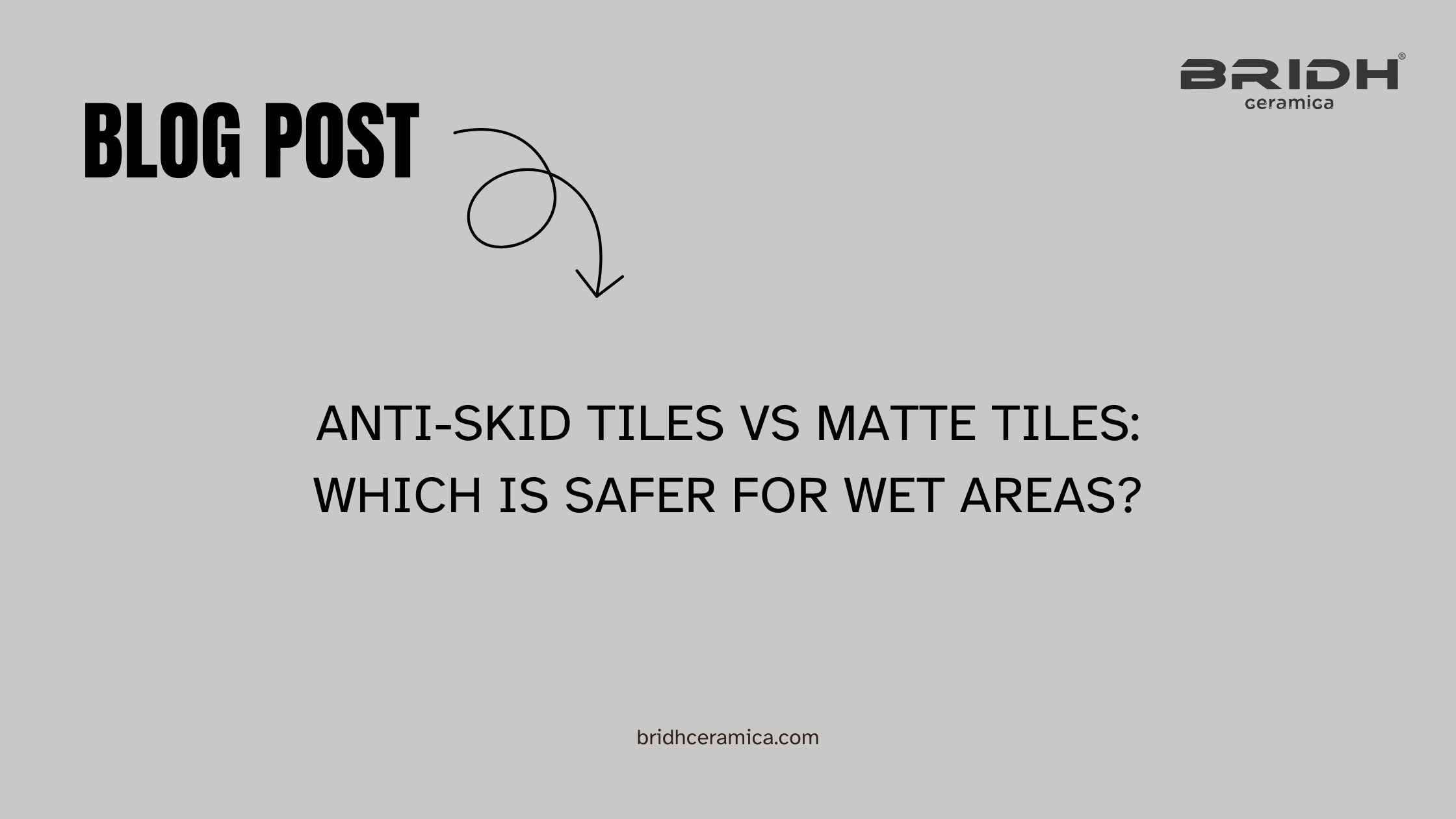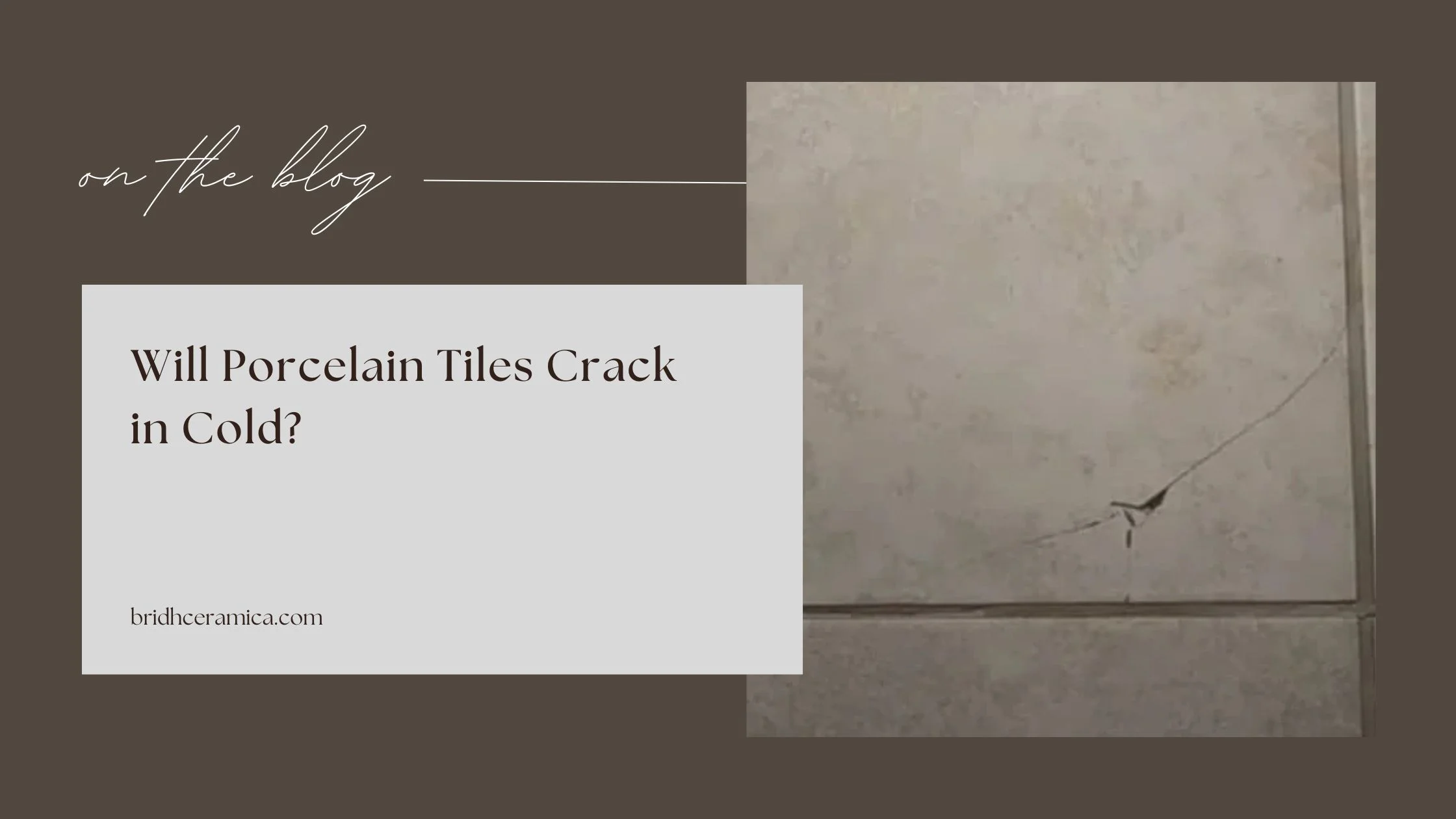Which Tile Last Longer: Ceramic, Porcelain, or Full Body?
Mar 05, 2026Connect With Our Team
Introduction
Although porcelain tiles characterize many houses and commercial spaces, their service benefits are undeniable. They prove durable, with excellent aesthetic appeal and one of the more versatile solutions for indoor and outdoor applications. A common question is usually whether cold weather will crack porcelain tiles. The answer lies in an understanding of the main features of these tiles.
Porcelain tiles are dense, impervious to moisture, and highly resistant to wear.
These stones are suitable and great for cold climates because they withstand freeze-thaw cycles without cracking.
This article is going to explore how cold weather impacts tile performance, take the opportunity to highlight the benefits of using porcelain tiles in such conditions, and outline some crucial installation considerations that guarantee longevity and performance.
Understanding Porcelain Tiles
Porcelain tiles are widely used in different applications because of their exceptional material properties. Fine clay and mineral feldspar constitute the main composition of these tiles, which are fired at very high temperatures.
This gives the production a very dense and hard product, which is the singular characteristic of making them from other types of tile materials.
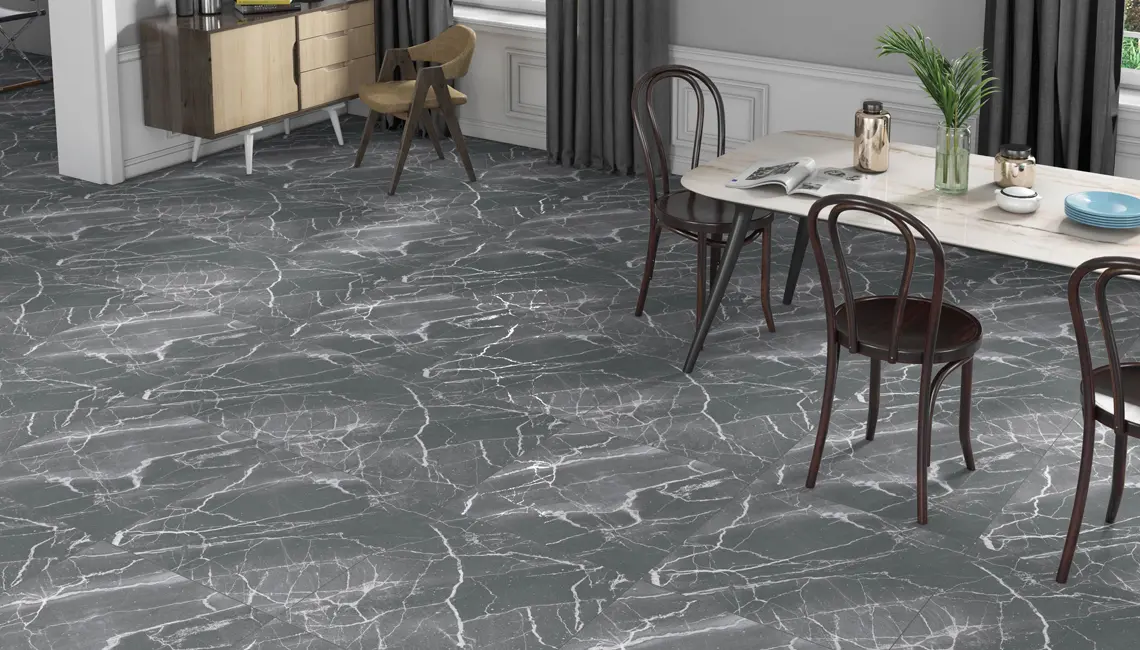
Comparison with Other Tile Materials
-
Ceramic Tiles: Though they look more alike, ceramic tiles are less dense than the porcelain tiles. These are highly water-absorbing and therefore not that great for very cold places.
-
Stone Tiles: The natural stone makes it exclusive as a look but porous and thus needs sealing to avoid absorbing moisture.
Features Contributing to Its Durability
-
Imperviousness: Porcelain tiles contain less than 0.5% by absorption rate, making it nearly impervious to water.
-
Moisture Resistance: They ensure good performance in the freeze-thaw cycle that automatically reduces the chances of cracking.
All these facts make porcelain tiles an effective choice for areas exposed to temperature and moisture changes.
The Impact of Cold Weather on Tile Performance
Freeze-thaw cycles present unique challenges in building materials, particularly those exposed to the environment. Freeze-thaw cycles involve moisture penetrating a material, freezing, then thawing again. At this point, the material can expand and contract. That expansion and contraction can be damage-causing.
These cycles can be devastating for flooring materials. Water freezes inside the pores of a tile, expanding and placing pressure on the structure of the material. If the tile is not designed to hold up against these stresses, this results in cracks or spalling.
Porcelain, however, is engineered to withstand such conditions. Low in water absorption, it is less prone to damage from freeze-thaw cycles than other porous materials like ceramic or stone. When looking for flooring selections for cold climates, understanding these dynamics is important in making decisions regarding long-term durability and longevity.
Why Porcelain Tiles Are Ideal for Cold Climates
Durability in Freezing Conditions
Porcelain tiles are quite strong and resilient to fracture, especially in cold weather. Compared to other materials, porcelain might be brittle and shatter, but the engineers designing them know that they have to withstand the freezing atmosphere conditions. The material is very resistant to cracking due to having a water absorption rate that is mainly less than 0.5 percent. It is under the freeze-thaw cycle that this characteristic plays a very important role in preventing cracking, and thus making it maintain the integrity of a tile. In fact, under such conditions, ceramic tiles also show excellent performance.
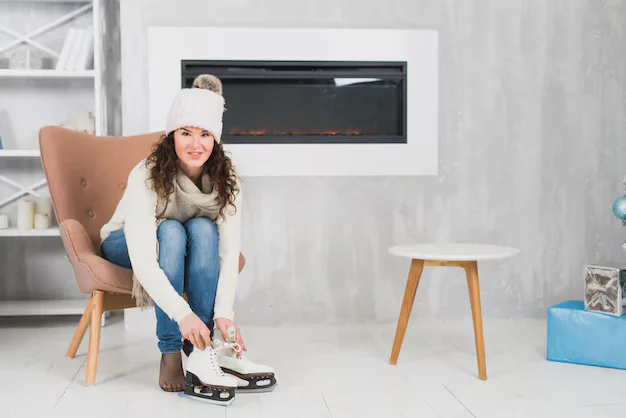
Proper Installation: Key to Preventing Cracking
Proper installation is one of the major causes that prevent cracking in cold temperatures in porcelain tiles. Not even the strongest tile is an exemption when it comes to failure under inappropriate installation. Among the things to adhere to in the installation process include the use of polymer or latex modified mortars. The performance of the tiles, whereby they attach and bend without easily detaching or cracking while serving, is enhanced by these mortars, thereby implying less stress from temperature changes.
Installation Considerations for Cold Weather Application
-
Polymer or Latex Modified Mortar: Such modified mortars support the bond that will exist between the tile and substrate even when the temperature changes dramatically.
-
Preparation of Subfloor: Such is equally important as the subfloor preparation. This includes:
-
Application of waterproofing membranes to inhibit moisture infiltration.
-
Crack Isolation Membranes in absorbing movement-and preventing cracks from transferring through the tile.
-
Its correct installation maintains its performance without moisture levels that do not influence the ability of the tile, thus durability and aesthetic appeal are maintained.
-
By considering these installation techniques, you might minimize the likely cracking, and extend the life of your porcelain tiles in cold climatic regions. The toughness of materials and meticulous installation ensure that porcelain is going to be one of the most popular choices in extreme climatic conditions.
Using Porcelain Tiles Outdoors in Cold Climates
Porcelain tiles would be an excellent option for outdoor space, particularly in areas with cold climatic conditions. They are extremely strong and not easily prone to absorbing moisture; hence suitable for outdoor rooms exposed to the climate.
Benefits of Using Porcelain Tiles Outdoors
-
Resistant to Freeze-Thaw Cycles: Porcelain tiles have resistance to water absorption usually at 0.5% or less, that water does not penetrate and cause crackings during freeze-thaw cycles.
-
Durability Under Heavy Loads: From foot traffic to outdoor furniture, porcelain tiles remain strong without chipping or cracking.
-
Slip Resistance and Aesthetic Appeal: They can be supplied in various finishes from smooth to matte, providing slip resistance and adding aesthetic appeal to the external space.

Where to Use Porcelain Tiles Outdoors
-
Patios: Porcelain tiles can make outdoor entertaining areas elegant.
-
Walkways: Their strength allows porcelain tiles to shine for walkways that bear the paces day in and day out, meeting and experiencing various types of weather.
Installation of porcelain tiles both in those exterior spaces will give functionality and aesthetics, thus making it a favorite pick, especially in cold weather areas.
Potential Issues with Improper Installation and How to Avoid Them
Porcelain tiles are very resistant and can tolerate low temperatures; however, their benefits all come under question with inappropriate installation. Spalling is perhaps the most common issue resulting from inappropriate installation. It results when water gets beneath the tile and freezes, expanding it and, consequently, cracking or breaking the tile surface. The main cause of most spalling is moisture-related problems, which originate mainly due to inappropriate installation.
Risks:
-
Porous Materials: Porous materials settle into wet slush with porcelain tiles, which absorb and retain a lot of moisture. In extreme cold temperatures, that moisture can freeze and expand, causing the tiles to crack or spell.
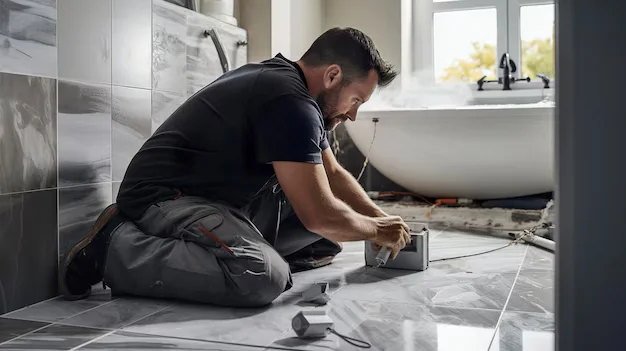
Consequences:
Poor Installation: Failure to adhere to primary installation parameters such as using unmodified mortars or omission of waterproofing provisions compels the tiles to crack. However, will Cold Damage Porcelain Tiles? Yes, if the pre-installation is not done.
Prevention Tips:
Use polymer and latex-modified mortars for increased moisture protection.
Implement waterproofing and crack isolation membranes in the subfloor to prevent water ingress.
Following these guidelines, you will be able to guarantee the porcelain tiles survive the test of time even when the coldest of cold climates is hitting them.
Conclusion: Making Informed Choices for Tile Selection and Installation in Cold Environments
Porcelain tiles are a smart choice for cold climates: strength and beauty. Since they are impervious to water, thereby resistant to moisture stresses that cause cracks in tiles under freeze-thaw cycles. When installed with proper care; polymer or latex-modified mortars along with proper subfloor preparation allow porcelain tiles to stand better in harsh conditions. Their slip-resistance thereby adding onto integrity under heavy usage and maintaining it enhances their appeal. Exploration of those benefits leads to answering the question: Will Porcelain Tiles Crack in Cold? With proper installation techniques, porcelain tiles endure and remain robust.
FAQs (Frequently Asked Questions)
1. Will porcelain tiles crack in cold weather?
Porcelain tiles are designed to withstand cold climates due to their durability and resistance to cracking. When properly installed, they perform well even in freezing conditions.
2. What are the key characteristics of porcelain tiles?
Porcelain tiles are known for their imperviousness, moisture resistance, and durability. They are made from denser clay and fired at higher temperatures compared to other tile materials like ceramic and stone.
3. How do freeze-thaw cycles affect tile performance?
Freeze-thaw cycles can pose challenges for building materials, including flooring. These cycles can lead to expansion and contraction, which may cause cracking or damage if the materials are not suitable for such conditions.
4. What installation considerations should be taken into account for porcelain tiles in cold climates?
Proper installation is crucial in cold-weather applications. It's important to use polymer or latex-modified mortars for enhanced performance and to prepare the subfloor adequately with waterproofing and crack isolation membranes.
5. Can porcelain tiles be used outdoors in cold climates?
Yes, porcelain tiles are ideal for outdoor settings exposed to cold weather, such as patios and walkways. Their durability makes them a great choice for these applications.
6. What issues can arise from improper installation of porcelain tiles?
Improper installation can lead to problems such as spalling and moisture-related issues. Using porous materials alongside porcelain tiles can increase risks, highlighting the importance of correct installation practices.
Whatsapp Chatx
Hi! Click one of our representatives below to chat on WhatsApp or send us email to dhaval@bridhceramica.com

|
************** +91 97023 82809 |
 TILES VIEW
TILES VIEW


